Siddhartha debuted its four-week run at the Hip Pocket Theatre recently, and the stage adaptation of Herman Hesse’s novel is a fitting choice for the troupe’s 35th anniversary season. The book’s theme of putting oneself in poverty to better find happiness through spiritual enlightenment could easily describe Hip Pocket founders Johnny and Diane Simons.
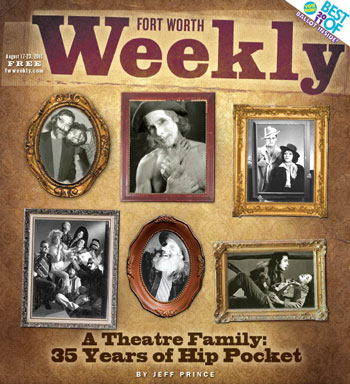 Both were entrenched at Fort Worth’s Casa Mañana theater in the 1970s. Diane sewed costumes, and Johnny did … well … Johnny did just about everything — playwright, director, choreographer, actor, dancer, mime, musician, composer, singer, arranger, painter. Their paychecks provided stability. They had babies to feed. Bills to pay.
Both were entrenched at Fort Worth’s Casa Mañana theater in the 1970s. Diane sewed costumes, and Johnny did … well … Johnny did just about everything — playwright, director, choreographer, actor, dancer, mime, musician, composer, singer, arranger, painter. Their paychecks provided stability. They had babies to feed. Bills to pay.
Still, they quit.
“You can only do The Sound of Music so many times, and then you start going insane,” Johnny said. “I got tired of doing standard commercial theater because I had no personal connection with it. Not that I despise traditional theater at all, I respect it very much. I’m just not quite a fit in that world. I wanted to do theater but do it in my world.”
His new world needed a sun, and up rose theater wunderkind Douglas Balentine, a pianist and composer as well as actor, singer, set builder, stage manager, and lighting designer. To prove mutual devotion to their entrepreneurial dream, Simons and Balentine went out behind Casa Mañana one day in 1976, struck a match, and set fire to something they both cherished — their Actors’ Equity union cards. After that symbolic gesture, they grabbed cold beers and discussed launching something new to Fort Worth — experimental theater in an outdoor setting with a focus on fun and affordability.
They recreated Tommy in 1977 as pantomime without dialogue, prompting a Texas Monthly critic to complain that the “hyperactive performers constantly seemed to endanger the spectator’s life, limb, and after-dinner pitcher of wine.” From the beginning the Hip Pocket was multimedia, with groovy slide projections and film clips enhancing productions, while at other times the troupe eschewed props altogether and forced the audience to rely completely on imagination.
All these years later, the theater has staged 250 productions and established itself as a one-of-a-kind presence that retains its original flavor and funkiness even as it’s evolved. Balentine died in 2008. Johnny turned 72 this month and is slowing down. Diane (pronounced Dee-Ann) remains by his side as wife, producer, business manager, and costume designer, but with a tad less pep in her step. Their children are grown and gone — Lorca Simons is established in the London theater scene, and Lake Simons is making it in New York with her experimental puppetry. Neither offspring appears bent on taking over the family business. A board of directors oversees things, but the heart and soul is Johnny. And he’s been feeling nostalgic lately. Maybe even a bit haunted. Balentine’s unexpected and mysterious death in 2008 unsettled him.
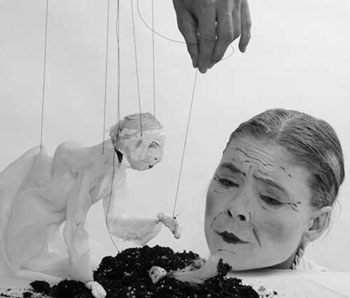 Those early years were a blast. A diverse crowd from near and far filled the bleachers and remained loyal through address changes, myriad styles, and the occasional stinker that results from a hectic production schedule, shoestring budget, and willingness to push the theatrical envelope … sometimes off a cliff.
Those early years were a blast. A diverse crowd from near and far filled the bleachers and remained loyal through address changes, myriad styles, and the occasional stinker that results from a hectic production schedule, shoestring budget, and willingness to push the theatrical envelope … sometimes off a cliff.
“You never know; it’s all an experiment,” Johnny said.
Original board member Joe Waller said the nonprofit theater tries to be different, and “different” can be misunderstood. Most newcomers are surprised to discover that even Johnny’s most experimental forays usually remain grounded and “couched in a way that is sweet and positive and very approachable,” Waller said. “It is really a positive and powerful thing done in a folksy manner.”
The Simonses still love their world, and they’re not going anywhere. This season runs through October, and then they’ll start getting ready for another, earning little money for their efforts but at least creating something unique and fun. The Simons earn about $30,000 between them for their year-round efforts at Hip Pocket, and they often struggle to pay bills. They can’t afford to retire anytime soon. The future rests squarely on Johnny’s narrow frame. He’s fit, trim, and eager, but he’s not Superman. Nobody writes forever. And it’s painfully clear he’s still dealing with Balentine’s loss.
“We really miss him,” he said. “As far as the plays go, I’ll never be able to find anybody to equal his talent. I accepted that all that was over.”
Music and beer are as crucial to Hip Pocket’s vibe as the actors and makeup. People gather early to hang out in a “backyard” area, listen to acoustic music, sit and chat, and enjoy food and drinks. A ringing cowbell lets them know it’s time to head over to the large stage to see the night’s performance. Afterward it’s back to the backyard for more drinks and music.
A couple dozen people gathered early on a July evening, anticipating the final performance of Lake Simons’ intriguing Wind Set-up, a composition for materials and elements. Actors used simple props, seductive stage movement, and interpretive music to tell stories without dialogue, and it was fascinating to watch. Lake lives in New York, but returns to Hip Pocket for a few weeks each summer to direct a play.
As the early crowd mingled, Johnny sat on a 1940s-era metal bench, nursing a Milwaukee’s Best (“the cheap stuff”) and talking in his quiet, sparse way with an old friend. A camouflage gimme cap barely contained his wild, gray hair, and his t-shirt was stained with sweat.
Johnny has a gift with words but rarely brings out that magic in conversations with writers or critics. He has interpreted and translated many stories over the years but doesn’t relish being interpreted or translated himself. So for the most part, Johnny writes plays and Diane does the talking.
Before shows, Diane greets the crowd while Johnny looks for a place to hide. Hip Pocket regulars are supportive and reverential, but the outdoor setting, casual dress, access to booze, and a growing ignorance of modern-day crowds with cell phone mania can spur conflict. A ringing phone, an obsessed texter, a flash camera — any of those things can mar a performance. The cast works hard to make shows captivating, and one jerky audience member can take an entire crowd out of the moment. Johnny has been known to stop plays and embarrass offenders.
“If nobody tells them, how are they going to know?” he said.
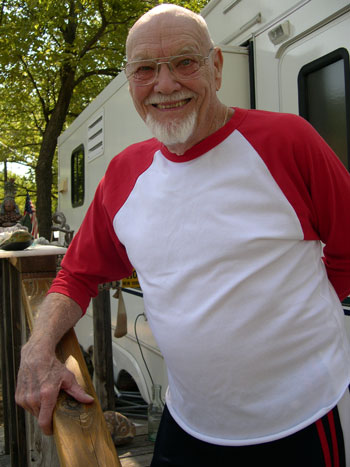 Not everyone appreciated his effort, so now he makes himself scarce once shows begin.
Not everyone appreciated his effort, so now he makes himself scarce once shows begin.
“My wife and the board have called me out on it,” Johnny said. “I’m afraid I’ll go to the penitentiary.”
But an open and friendly Johnny greeted me from that bench when I introduced myself. He was in good spirits after spending time with his daughter and seeing her production attract decent crowds despite its quirkiness.
“It’s a real artful piece, and I’m proud we had it here,” he said.
Johnny loves nothing better than seeing his energetic daughter and her New York friends hit town with fresh ideas.
“It’s a different kind of talent pool she’s able to tap,” he said. “It brings in new blood, which is good.”
Diane walked by us a few times, casting surreptitious glances. She typically rescues Johnny from unwanted pow-wows, but she wasn’t noticing his telltale signs of anxiety, and so she let us be. She was shocked when Johnny invited me to their home later that week for more talk.
Over the course of several days, Johnny reminisced about decades of revelry, but the recurring theme was Balentine. Tears filled his eyes and choked his voice when he recalled his old friend.
What did he miss most?
“I miss him being on Earth,” Johnny said.
The Simons-Balentine musical partner-ship was simple — Johnny wrote the scripts and lyrics, Balentine wrote the music and sang. Individually they were exceptional. Together they were untouchable. Their off-the-wall plays attracted a throng of actors wanting in on the fun, and Johnny customized productions to accommodate the specific strengths of his fast-growing troupe. Balentine’s beautiful melodies and pop sensibilities helped to ground Johnny’s free-flowing fantasies.
“Johnny and Doug were a great team, and it was amazing the work they did together,” said Jimmy Joe, an 82-year-old actor, Baptist minister, and former biker and circus entertainer who was instrumental in getting Hip Pocket started. “It was different than other theater groups. Most are rigid about what you can do. Hip Pocket had more fun. I don’t know what the word genius really means, but I’d consider Johnny a genius.”
Joe worked on plays at Casa Mañana in the early 1970s and starred in The Lake Worth Monster, the production that was Johnny’s thesis for his master’s degree in theater at Texas Christian University.
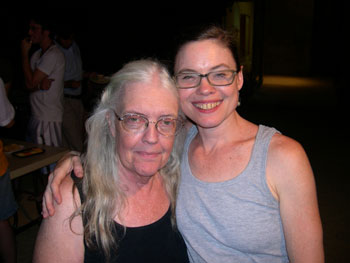 Back then Joe hung out at Grissom and Friends, an old tourist court transformed into an arts and crafts community on Highway 80 in far West Fort Worth. Joe liked the artistic feel and saw the courtyard as an ideal spot for an outdoor theater. He invited Johnny and Diane to check it out.
Back then Joe hung out at Grissom and Friends, an old tourist court transformed into an arts and crafts community on Highway 80 in far West Fort Worth. Joe liked the artistic feel and saw the courtyard as an ideal spot for an outdoor theater. He invited Johnny and Diane to check it out.
“Something struck — they really liked it,” Joe said. “Like it’s called, they reached into their hip pocket and came up with the money.”
They didn’t have much money, but they didn’t need much except for cheap secondhand lumber and stage lights. Joe and Balentine built the stage, Johnny prepared a script, and Diane made wardrobes. She’s lived and breathed theater her entire life and is renowned for making costumes out of almost anything. She once clothed an entire cast in donated neckties. “Skirts, shirts, and everything,” Joe said. “They were very colorful.”
The Hip Pocket was a success from the start. One-of-a-kind productions paired with a $2.50 admission proved to be an enticing combination.
“It was the right time,” Joe said. “It was outdoor theater that was called avant-garde, doing things other theaters weren’t doing. We’d go out in the audiences and get them involved. Sometimes, afterward, we’d stay and dance until three or four in the morning — the actors and the crowd.”
The theater and its creative boss were unusual for Fort Worth. Still are.
The Riverside neighborhood of East Fort Worth was his childhood home, but Johnny spent much of his time at a favorite aunt’s house near Lake Worth or at his grandparents’ nearby farm. Entering this world in 1939 made him too young to be a beatnik and too old to be a hippie, but he sampled both scenes from an idyllic distance.
He was, at heart, a farm boy with an imagination. As a kid he wanted to be Tarzan. In high school it was Gene Kelly. In college he wanted to be Marcel Marceau. By the time he’d earned his master’s degree he was a little of each, and more.
The journey wasn’t bump-free. Polio struck when Johnny was 10. He was fishing for crappie at Lake Worth at the time. “I remember distinctly the day it happened,” he said. “I was sitting on a pier out at the lake, and suddenly it just came upon me, this strong feeling of … I don’t know how to describe it, but I just knew something physically had happened to me. I felt very ill.”
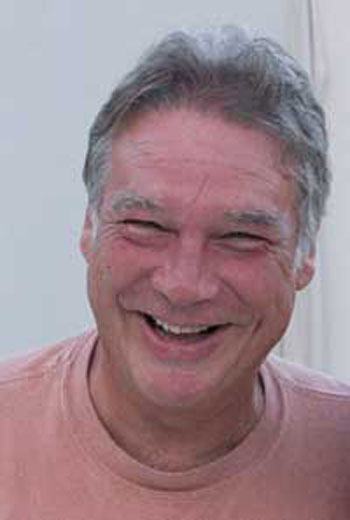 He was hospitalized, underwent painful physical therapy, and missed a year of school. His aunt, a physical therapist, suggested dance classes to build strength, but “My dad was not too keen on that,” Johnny said.
He was hospitalized, underwent painful physical therapy, and missed a year of school. His aunt, a physical therapist, suggested dance classes to build strength, but “My dad was not too keen on that,” Johnny said.
Too late. The sapling had been bent, and Johnny would forever after lean toward art. He’d begun painting, which made the house reek of turpentine from mixing oil paints. Now dance was on his radar as well.
“Like a lot of kids who get into the arts, I was never terribly interested in athletics,” Johnny said. “I was pretty good at basketball, but I was a little too small, and it didn’t appeal to me much. Any kind of competition, I just wasn’t interested in. I didn’t see the point of running after a ball and getting run over.”
He was an outsider at school, singing in the choir, acting in theater class, and dealing with peer pressures that “are still prevalent, I suppose, in some places today — that if you’re involved with the arts, you’re a sissy.”
After graduating from high school in 1957, he joined the Navy but was honorably discharged before he even finished basic training. His polio-weakened body couldn’t handle the rigors of military life. Johnny came home and enrolled at TCU. He’d become infatuated with mime and was also eager to strengthen himself.
“For some reason, to take mime, you couldn’t be a theater major — you had to be a dance major,” he said. “So I said, ‘Dad, I’m going to change my major to dance.’ ”
Dad handled it in typical 1950s-era fashion: “He said, ‘Oh no, God no, what are you going to do when you grow up? How are you going to support yourself?’ ”
Johnny didn’t know. But his hard work eventually earned him a surprising fan.
“My father became very supportive,” he said. “He began to see the athleticism involved and how difficult it was.”
The next 10 years were a ricochet existence. Johnny quit TCU, hit the New York theater scene, felt like a displaced farm boy there, came home, returned to TCU, got married, became a father, worked at Casa Mañana, got divorced, moved to the French Quarter in New Orleans, returned to Casa Mañana, met Diane, remarried, and became a father again. He was approaching 30 when a friend returned from a summer trip to San Francisco in 1967 bearing an unusual gift — a batch of Owsley acid, named after the late underground chemist Owsley Stanley, a major figure in the West Coast counter-culture. LSD was still legal then.
“So I had this fabulous acid trip at Casa Mañana under that dome, and it was one of the greatest experiences of my life,” Johnny recalled. “I’m still high from it.”
The theater’s director was less impressed. He wanted to know if Johnny was addicted.
“I said, ‘No sir, I don’t think I am,’ ” Johnny recalled, laughing. “He said, ‘Well, if you do it again, we’re just going to have to say goodbye.’ And of course I did it again.”
A building engineer came into the theater during Johnny’s second trip.
“I saw him and thought I better hide because I’m high, so I put a wastebasket over my head so he wouldn’t be able to see me,” Johnny said. “He went and told — he said, ‘Something’s wrong with Johnny.’ ”
Time to move again.
Diane got a job at Alley Theater in Houston, and Johnny taught mime at the University of Houston. Later he returned yet again to TCU to finish his undergraduate degree and earn a master’s. After convincing Casa Mañana that his acid experiments were behind him, Johnny took over creative control of Casa’s summer playhouse theater just as the city was gearing up for the 1976 Texas bicentennial celebration. Casa wanted a play about Fort Worth called Out Where the West Begins and pegged Johnny to write and direct.
Johnny needed a composer and remembered a young prodigy from his early days at Casa. Balentine was playing piano at The Red Slipper lounge on East Lancaster Avenue.
“I went to hear him play one night, and I said, ‘Do you want to come do the show with me at Casa Mañana and play J. Frank Norris?’ ” Johnny said. “That’s how our collaboration started.” Norris was Fort Worth’s most flamboyant, fire-breathing preacher.
The show drew a packed house and gave Johnny, Diane, and Balentine the confidence to leave Casa. Like any good playwright, Johnny wrote what he knew. Hip Pocket’s early productions include The Lake Worth Monster, Cowtown!, and Tarzan of the Apes. Johnny and Balentine’s partnership sparked an artistic bonanza.
“This huge mountain of material just began to pour out of them,” Diane said.
The plays kept coming for years.
“He was a godsend to me,” Johnny said. “We were both Fort Worth guys. It was a natural, easy thing. I’d write lyrics to the play and sit down at the piano with him. He’d say, ‘OK, what do you got?’ I’d sing whatever melody I’d written the lyrics to, and he could just play it. As we continued on, I’m not really versatile on melody, so he would just take the lyric and play what he wanted to hear.”
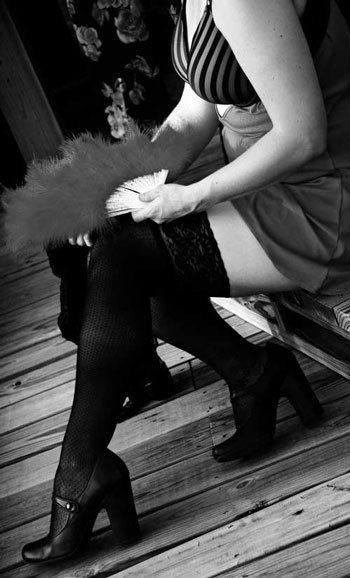 The theater was seldom dark. When one play ended, another began the very next week whether the troupe was prepared or not.
The theater was seldom dark. When one play ended, another began the very next week whether the troupe was prepared or not.
“We were just churning them out,” Johnny said. “It never stopped. We were working our butts off, but we were young enough to do that. Nowadays I don’t think I could do it. The quality of the play is a little better if we give ourselves a little more time.”
Balentine was a Renaissance man with boundless energy and a hollow leg for drinking. Like Johnny, he was focused, hardworking, private, and complex. As the years and plays went by, Balentine grew restless. Other theater offers materialized. It bothered Johnny to see his creative partner eyeing those offers. Friction surfaced.
Meanwhile, Balentine fell in love with Hill Country actress Susan Neely. Then Balentine was married and gone to Kerrville, and Johnny was on his own, although they remained close friends to the end and occasionally re-teamed for Hip Pocket productions. (The first theater experience of my life was Old Tarzan at Hip Pocket in 1986, and I still remember how much Balentine’s musical accompaniment moved the crowd, myself included.)
“It’s one of those things where you’ve been writing with someone for so long, in a sense it was kind of like a marriage,” Johnny said. “I always felt like we were soul brothers and still do. That was tough when he left. We both loved each other, but it was time to go in a different direction for him, and it probably was good for me too. It made me focus more on my writing.”
Johnny put in a DVD on a recent afternoon, and we watched footage of a young Balentine being interviewed about some production or another. He was robust, healthy, holding a beer next to his gut, smiling, and even offering the unseen interviewer a beer at one point. Next, Johnny played a tape of Balentine singing, and silently cried through most of it.
Balentine died on a solo camping trip in the Davis Mountains State Park in December 2008. It was cold that night. He put a small grill with hot coals inside his van. Maybe he was seeking warmth, maybe something else. In any case, he asphyxiated from the charcoal fumes.
“He had warned me years before,” Johnny said. “I’ve had several close friends who have committed suicide. Doug said, ‘You know, one of these days I plan to put an end to myself when the time is right.’ It could very well have been an accident, but I don’t think so. I think he just decided it was time.”
Johnny’s guess is probably better than anyone’s about what might have pushed Balentine to die alone on a cold December evening in the mountains, but he doesn’t know for sure. Perhaps it was unhappiness. Maybe he just got tired of life. He was a deep thinker. Sensitive. Maybe he wanted to direct his final exit in his own manner.
Johnny was getting upset again, and I changed the subject. For a few minutes, we discussed the theater props adorning the walls of the Simons house. Then he took me to a room to look at framed photos on the wall, and, of course, Balentine’s was among them.
“Well, I guess we circled back to Doug again,” Johnny said with a rueful chuckle. “Seems to always happen. He is such an integral part of our lives.”
Johnny and Diane have a sweet set-up for the reclusive life. Hip Pocket is on the outskirts of West Loop 820 on former ranchland once home to a gun club. It’s in the sticks but only 15 minutes from downtown. Farther west, in Parker County, the Simonses live in a log cabin on four heavily wooded acres. Privacy abounds. Johnny needn’t see anybody other than his theater friends and family.
“I haven’t been to downtown Fort Worth in years,” he said. “I try not to go past Cherry Lane. It’s not my deal.”
Step out the back door of the Simons cabin, and you’re on a deck overlooking a long drop onto rough terrain. The lack of a guardrail accentuates the height. A storm blew away the railing several years ago. People uncomfortable with heights might even envision themselves falling … smacking into the rocky turf … rolling down the incline through cedar, cactus, and mesquite.
Johnny and I stepped out there recently seeking natural light for taking photos. He said nothing at the time, but the missing guardrail, like so many other things, is another reminder of Balentine.
A few days later, Johnny asked if I’d be interested in reading one of his scripts. The Angel Play — A Suicide Burlesque arrived typed and printed on 20 pages held together by a paper clip. Johnny shuns computers. The play is dedicated in part to “all the merry little breezes, now all blown away.” It’s Johnny’s emotional struggle over his friend’s death, played out artistically.
The story opens with “Jimmy” trying to process the recent suicide of his best friend “Dugan.” In true Simons fashion, the real and surreal are soaked in a Fort Worth vibe and glittered in angels, apparitions, devils, dancers, mimes, lights, and music.
On page 13 is the following dialogue:
We were out on my back deck about 12 feet up from the ground where the poison ivy grows. Dugan was so drunk he almost toppled over the edge. I had to grab him and pull him back. He could have killed himself, and you know what he said afterward? He said, “What do you do that for?” And I said, “To save your life, idjit.” And he says, “Well, don’t ever do it again.”
That conversation played out for real on the back deck not long before Balentine died. Angel Play opened the 2010 season at Hip Pocket. It’s the kind of play that might bring closure for its author. Theoretically.
“I wrote that thinking I was going to purge myself a little bit from Doug’s passing, but it kind of heightened it,” Johnny said. “You just can’t shake it off.”
Then again, maybe closure isn’t a good thing for someone who relies on emotion and inspiration to crank out unique tours de force on the outskirts of Cowtown on breezy summer evenings. Balentine is never coming back. But Johnny’s still very much here.




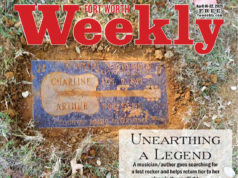







[…] Posted by Alexandra MeadowsHip Pocket Theatre-Related Kickstarter Campaign Ends Dec. 8Old Tarzan at Hip Pocket Theatre was the first play I ever saw — and it blew me away. The story concept was cool: Tarzan has […]